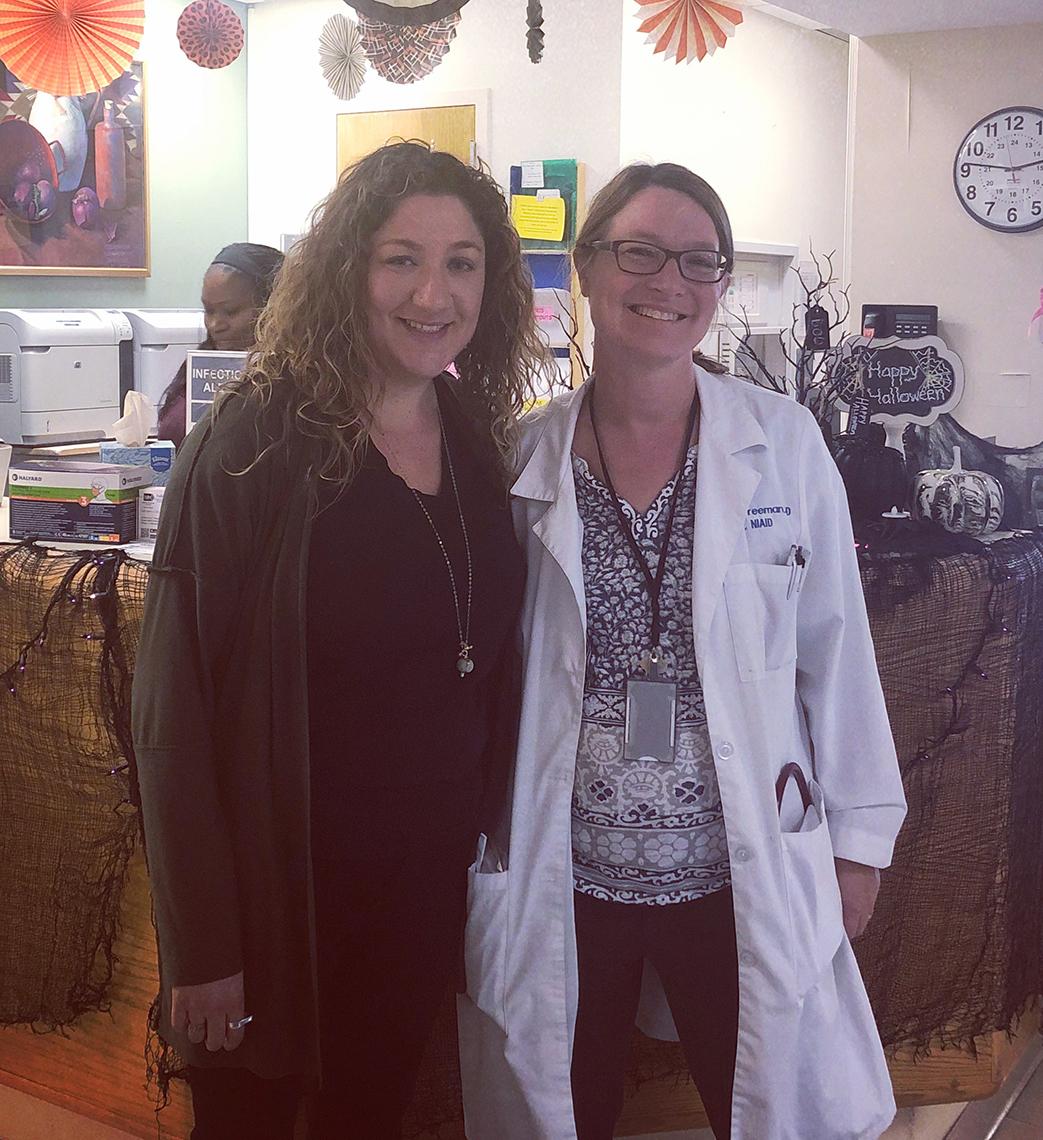NIH Patient Shares Stories of ‘Invisible Illness’

Harper Spero spent the first 27 years of her life hiding her rare disease from family and friends. Determined to live a normal life, she spent years managing her symptoms while ignoring her doctor’s repeated pleas to seek help at NIH.
After going public with her story 7 years ago, Spero started looking for ways to help others. In July 2018, she launched a weekly podcast featuring people like her, who seem fine on the outside but live with the daily struggles of chronic “invisible illness.”
“I knew of NIH years earlier but didn’t want to be a specimen,” said Spero, a business coach and consultant, on the first episode of her podcast series, Made Visible. A turning point came in 2012, when she had to decide whether to have life-threatening surgery. “At that time, I instinctively knew that going to NIH was exactly what I needed to do.”
A native New Yorker, Spero had started an exciting new PR job when she began to get easily winded. A visit to a pulmonologist revealed a cyst the size of a golf ball in her lung. Now she needed another medical opinion. The required surgery would be especially risky given her immunodeficiency disease.
That diagnosis came when Spero was 10. She was born with hyper IgE, also known as Job’s syndrome, a rare disease that leaves patients prone to infection and affects many parts of the body.
“Growing up, I was so ashamed of my health condition,” she said. “I was used to being uncomfortable in my skin…Things continued to get worse.”
At age 27, Spero remembers feeling terrified riding in the car with her parents to Bethesda. Her fears were quickly allayed when she arrived at the Clinical Center.
“I’ve never felt such competence in the hands of doctors as when I met Dr. [Alexandra] Freeman and Dr. [Steven] Holland,” Spero said. “Nobody has taken care of me like this team. They care on a personal level...They were so dedicated to figuring things out.”
Freeman and her team confirmed Spero should have the surgery. In March 2012, a quarter of her right lung was removed and she took a 2-month medical leave to recover.
“When I decided to tell people, I suddenly felt like I was removing a mask I’d been wearing [my whole life],” said Spero, who has since celebrated each anniversary of her surgery with family and friends.
“It’s a reminder that the routine challenges associated with my invisible illness are still a huge part of my life, but there’s a lot to be thankful for,” she said.
Going public about her condition was liberating but also tough. There’s no manual for this, Spero noted. Friends and family, shocked by the news, were unsure how to react and support her needs.
“I learned you can go to a dark place and come out on the other side,” said Spero. “Things get better even though they don’t become totally perfect.”
On her podcast, Spero interviews people coping with mental health conditions, Asperger’s syndrome, diabetes, cancer, multiple sclerosis, rare genetic disorders and hearing loss. She aims to make each episode compelling and educational.
“I created the podcast so that a person—whether living with or affected by invisible illness or the average person listening—is learning and becoming more compassionate and empathetic,” said Spero. “I’m not looking for people to be upset; I’m looking for people to be inspired when they learn more about these amazing people.”

Meet podcast guest Anthony, who has Asperger’s syndrome, clinical depression and anxiety. Doctors had told his mother he’d be nonverbal and nonfunctioning in society. Today, he’s an award-winning playwright who uses theater and the arts to challenge misconceptions about autism spectrum disorder and mental health issues.
“There is so much stigma attached to mental health and other chronic health issues,” said Spero. “Everyone relates to being misunderstood. I tell people you must advocate for yourself because no one else will do it for you.”
Made Visible also gives voice to caregivers of loved ones with chronic illness. In one recent episode, Jan Wiese describes the daily stress of caring for her 10-year-old daughter, Lucy, who shares the same diagnosis and NIH doctors as Spero. Lucy’s condition has greatly improved since a bone marrow transplant 2 years ago, a journey featured on the recent NIH-focused Discovery documentary First in Human. Still, Wiese must manage Lucy’s many chronic health issues.
“I’m so busy advocating for my daughter, but you also have to advocate for yourself,” Wiese tells Spero. “I’ve learned to give myself a lot of grace.” She hopes their story will point others who might need help for Job’s or other rare diseases to NIH.
Spero still communicates with her NIH doctors weekly and visits the CC annually as 1 of 175 Job’s syndrome patients they’ve been tracking and treating. Having a cohort of patients together enables the research team to see patterns and better understand the disease, said Freeman on the Dec. 18 episode of the podcast.
Many of Freeman’s patients are thriving in large part due to early diagnosis and intervention. “Now, when people [with Job’s] have children with the disease,” said Freeman, “we can diagnose those children within the first couple of weeks of life and [their] lives are dramatically different from their parents.”
Through her podcast, Spero highlights the difficult and brave journeys of regular people who struggle daily with chronic illness but don’t let it rule their lives. Uninhibited, they’re eager to share their stories.
Spero recounted that it wasn’t long ago when she was pretending to be fine, internalizing her emotions while feeling increasingly isolated.
“When we don’t hide,” said Spero, “we find people we can relate to and start a conversation about what it means to live with an illness and not be defined by one.”
Listen to the podcast series at www.madevisiblepodcast.com.
